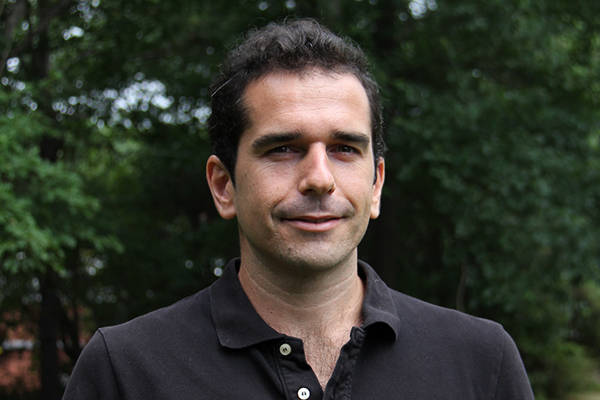Visiting air quality scientist to collaborate on R-LINE
August 4, 2017
While researching tools to help solve Barcelona’s air quality issues, Jaime Benavides came across a promising open-source modeling program called R-LINE that could help him forecast air quality in his home city. Benavides, an environmental engineering Ph.D. student focusing on air quality modeling at the Technical University of Catalonia in Barcelona and a scientist at the Barcelona Supercomputing Center, reached out to the developers of the model at the U.S. EPA and IE’s Center for Environmental Modeling for Policy Development (CEMPD).
Benavides and CEMPD set up a mutually beneficial visiting position where Benavides could work with modelers at UNC-Chapel Hill for four months on enhancing R-LINE for the work Benavides is doing in Barcelona. The visit will culminate in his participation at the annual CMAS Conference in October.
“I really hope that the work here can be useful to know more about air quality in cities,” Benavides said. “We are looking at the city to be open to other systems and that is very interesting for me to come here and work with CEMPD because they are giving me the perspective of making it broader in application.”
R-LINE is a modeling tool developed in 2013 to estimate air quality and possible human health impacts in urban environments by modeling the dispersion of roadway air pollution. Benavides is researching ways to integrate R-LINE with CALIOPE, the Spanish air quality forecasting system, which is composed of U.S. developed CMAQ and WRF, a meteorological model, and HERMES, an emissions model developed in Spain.
While Benavides is at CEMPD, he also is developing several papers that he will present at the CMAS Conference including research that he is doing to integrate R-LINE with existing models being used in Europe.
“For me as a Ph.D. student, it is a huge motivation to share my work with the community here and the international CMAS community,” he said. “We have seen in the last year that car factories are not giving accurate information on the emissions of cars and we have been using this information in the air quality models and air quality decisions all over the world. As a society we are making efforts to make that information better so we can evaluate the political measures to improve air quality in the cities.”
Benavides studied civil engineering as an undergraduate student and earned a master’s degree in artificial intelligence.
“I have a professional mission, which is to work in the environment,” he said. “I found air quality for my Ph.D. and I thought it was great because I wanted to work in innovation and environment.”
